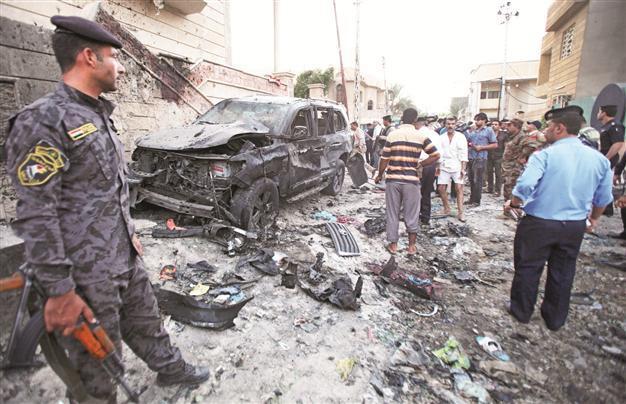Battlefields in Iraq and Syria merging: UN envoy
UNITED NATIONS

Security forces inspect the scene of a bomb attack in Basra. UN envoy says Iraq’s escalating violence can no longer be separated from the civil war in Syria. AP photo
Iraq’s escalating violence can no longer be separated from the civil war in neighboring Syria because “the battlefields are merging,” the U.N. envoy to Iraq warned July 16.Martin Kobler told the U.N. Security Council that Iraqi armed groups have an increasingly active presence in Syria. As a result, he said, the Syrian conflict is no longer just spilling over into Iraq, but Iraqis are reportedly taking arms against each other inside Syria, he said.
“These countries are interrelated,” Kobler stressed. “Iraq is the fault line between the Shiite and the Sunni world and everything which happens in Syria, of course, has repercussions on the political landscape in Iraq.”
Kobler said the last four months have been among the bloodiest in Iraq in the last five years with nearly 3,000 people killed and over 7,000 injured. He said the perpetrators are taking advantage of the ongoing political stalemate in the country and the Syrian conflict, which began in March 2011 and has killed over 93,000 people. He did not give any figures of Iraqis killed in fighting in Iraq but warned that the violence in both countries “could easily spiral out of control if not urgently addressed.”
Two main drivers
What’s critically important, U.N. envoy said, is to address the roots of the conflict in Iraq and find a political solution to the civil war in Syria.
As of July 7, he said more than 160,000 Syrian refugees have been registered in Iraq, mainly in the northern part of the country. He appealed to the Iraqi government to reopen the border to Syrians seeking protection.
Kobler said there are two main “drivers” behind the increase in sectarian violence in Iraq - a perception of “marginalization” by Sunnis in the region and Iraqis trying to go to Syria to fight, “which plays into the Iraqi politics.”
Last month, Iraq’s Foreign Minister Hoshyar Zebari said that the Iraq-Syria border even before the Syrian conflict was “troubled,” and the Americans helped build trenches to enhance border security. But he said the border is still “quite open for movement of terrorist groups, or weapons.”
Zebari also admitted recently that Iraq is unable to stop its neighbor Iran transferring weapons to Syria through its airspace. “We reject and condemn the transfer of weapons through our airspace and we will inform the Iranian side of that formally. But we do not have the ability to stop it,” he told pan-Arab daily Asharq al-Awsat.
The United States, which wants Syrian President Bashar al-Assad to relinquish power, has warned Iraq not to allow Iranian weapons flights to cross its airspace into Syria. But Zebari said he had told Western countries that if they wanted to stop such flights, they had to help do so themselves.
Kobler, who was addressing the Security Council for the last time on Iraq before taking up his new post as the U.N. special representative in Congo, stressed the importance of pursuing the U.N. mission’s mandate to promote national reconciliation in Iraq where Shiites dominate Sunnis, Kurds and other minorities.
He said the instability has seriously affected human rights, with one-third of children deprived of many basic services and fundamental rights and minorities being targeted for murder and kidnapping for ransom.
















